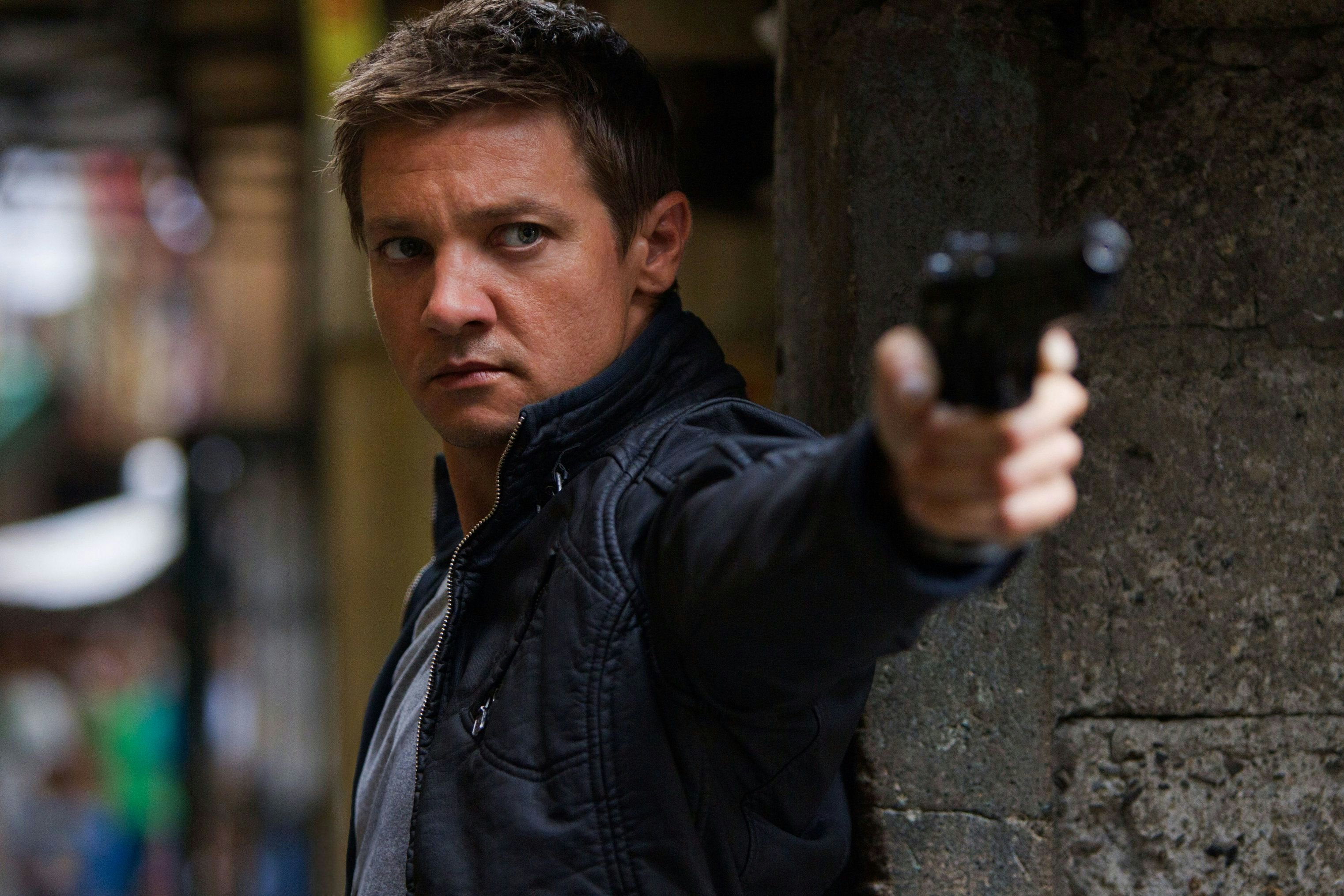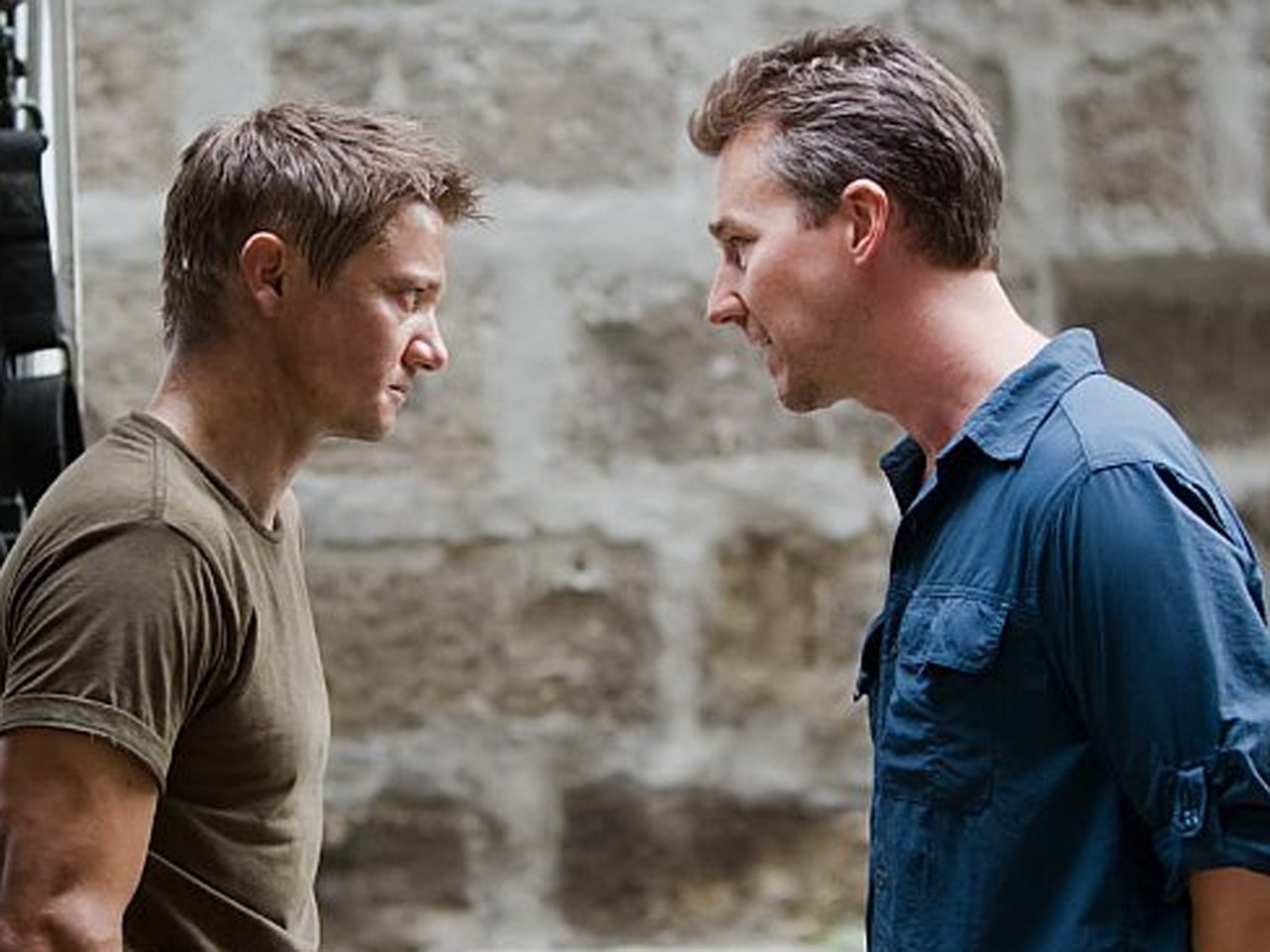
Back in 2012, Jeremy Renner was best-known as that guy who kept popping up in things: the 28 Days Later sequel, back-to-back Oscar-nominated flicks The Hurt Locker and The Town, supporting roles in Mission: Impossible – Ghost Protocol and The Avengers.
The Bourne Legacy was to be Renner’s star-making action-solo debut. It didn’t turn out that way.
There’s a moment in The Bourne Legacy, the fourth film in the action franchise, when this sequel finally feels like Jeremy Renner’s movie. In the scene, super soldier Aaron Cross and virologist Dr. Marta Shearing get cornered by security guards in a lab. Cross fast-talks his way out of a classic mix-up, all before his enhanced fists give the final word.
We know how Jason Bourne would handle the situation. We’ve seen him swiftly beat his way out of corners three times prior. The difference with Aaron Cross is he’s much better with words than stoic Bourne could ever be. Bourne may be more efficient, but Cross can smile his way through lobby security before anybody notices something is up. This scene finally articulates the difference between the two franchise protagonists. Unfortunately, it comes about two acts too late.
“There was never just one.” Admittedly, the tagline is an interesting way to expand the world. Not as forced as, say, a hard drive containing the identities of other superheroes.
It’s not a stretch, either. Bourne has gone up against other operatives played by Clive Owen and Karl Urban. But it’s difficult to have two leading men as the face of one franchise. It doesn’t help that, in an effort to smooth the narrative transition, Damon’s photo scores screen time in Legacy on top of numerous name-drops. In doing so, the film suffers a case of stolen Bourne identity — a back-and-forth between sequel and spinoff that never finds its footing.
Perhaps in an attempted solution to the two-leading-men-one-franchise balancing act, director Tony Gilroy feels the need to juice up the premise. Bourne was the superspy; Cross is the super soldier, part of a top-secret program called “Outcome.” Gilroy, who wrote the Bourne trilogy, retains his penmanship for gray areas and G-man conspiracies. The first 30 minutes of Legacy cleverly overlap with The Bourne Ultimatum. Gilroy sells the plausibility of Jason Bourne being the “tip of the iceberg,” pulling the curtain beyond Treadstone and revealing a bigger shadowy world that can turn on you any second.
One of the elements that made the franchise’s previous film Ultimatum so thematically gripping was its commentary on post-9/11 mass surveillance. Legacy wants to stay in that wheelhouse, but its plot is much pulpier: an intelligence agency strong-arm relentlessly clears house by hunting down agents, all in the name of institutional self-preservation. Then, the plot goes all-in on the super-soldier serum.
We’re eased into the Ultimatum tie-in via cameos of Albert Finney, Scott Glenn, David Strathairn, and Joan Allen, but when the dialogue switches to “chems,” “blues,” “greens,” and “program meds,” the lessons in human genomes prove tiresome. The decision to lean into the super-soldier-ness feels less like the inspired narrative stroke it may have been intended to be and more like Universal trying to cash in on the superhero craze. (After all, this was the summer of Avengers and The Dark Knight Rises.)
It doesn’t help that this installment is missing previous franchise director Paul Greengrass’ propulsive, handheld filmmaking — a visual style that defined the Bourne series, making the franchise feel like a Formula 1 race with all the anxiety of disarming an IED. Without Greengrass behind the camera, the film drags. Legacy might be able to coast if the action scenes were thrilling, but the scenes of Aaron Cross scaling two stories or shooting a bad guy through a door are more serviceable than spectacle.

Still, Renner sells a sense of urgency. Cross routinely checks his watch like a character tic, his moves timed to the millisecond. He knows he can only fool someone on the walkie for so long before backup arrives. Sure, Aaron and Marta get away with the ruse because the script demands it, but Renner’s everyman charm makes the success more believable. Physically, he’s as capable as one would expect Clint Barton to be — then, he opens his mouth and suddenly you wanna have a beer with him.
The film’s ending is meant to be hopeful. Marta’s “I was hoping we were lost” is intended to be a triumphant sentiment for our hero, once lost in a frozen wilderness. Instead, it speaks to the uncertainty of the franchise moving forward. There was a time when the Bourne series seemed miles ahead of 007. With Legacy, it felt behind the curve; a middle-budget actioner like The Bourne Legacy seemed woefully out of place in a studio arms race that was spending $200 million on the next big thing. Renner would stay committed to a sequel, but those talks whimpered out and he built his future in a more successful franchise. Another Bourne installment came to fruition in 2016’s Jason Bourne, to middling results, followed by a Treadstone TV show that only lasted a season.
A decade later, the action-spy thriller as a genre would find a second life on streaming with movies like Netflix’s Extraction and The Gray Man and Prime Video’s Without Remorse, as well as the Jack Ryan and Reacher series. Most of these feature familiar faces from the MCU. Almost all of them have sequels and spinoffs in the pipeline. It’s an interesting thought experiment: Could The Bourne Legacy have thrived on Peacock? Did Aaron Cross arrive too late to capitalize on The Bourne Ultimatum’s success, or too early for the streaming boom?
Whatever the answer to those questions, it’s clear that, where once the action-thriller thrived in theaters, that dominance has all but evaporated. The genre may now be finding a place as the foundation of the Netflix homepage, but the era of the action-thriller blockbuster has faded.
Universal didn’t realize it, but, by the time The Bourne Legacy was introduced to the world, the sun had already begun to set on action sleuths like Aaron Cross. That may prove to be the real Bourne legacy.







